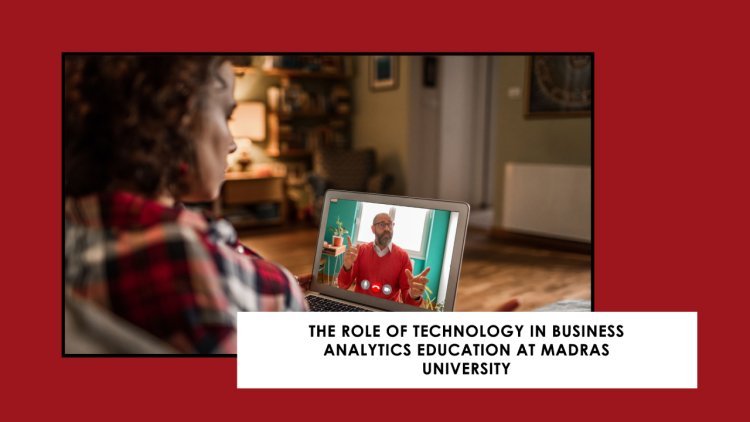The Role of Technology in Business Analytics Education at Madras University
Dive into how Madras University is revolutionizing Business Analytics education by incorporating advanced technology into its curriculum.

Business analytics has become an essential component of modern business operations, driving data-driven decision-making and strategic planning. At Madras University, the integration of technology into the business analytics curriculum is huge, providing students with the skills and knowledge required to excel in this dynamic field. This blog explores the use of software and tools in the curriculum, the importance of staying updated with technological advancements, and the future technological trends in business analytics.
Use of Software and Tools in the Curriculum
Madras University recognizes the critical role that technology plays in business analytics. The curriculum is designed to equip students with hands-on experience using a variety of software and tools that are industry standards. Here are some of the key technologies integrated into the program:
- Statistical Software: Tools like R and SAS are used extensively for statistical analysis. These platforms allow students to perform complex data manipulations and generate insights that are crucial for business decision-making.
- Data Visualization Tools: Software such as Tableau and Power BI are essential for creating visual representations of data. These tools help students learn how to present data in a way that is both understandable and actionable for business stakeholders.
- Database Management Systems: Knowledge of SQL and NoSQL databases is crucial for managing and querying large datasets. Students gain practical experience with these systems, which are fundamental in handling big data.
- Machine Learning and AI Tools: Python, with its extensive libraries like TensorFlow and scikit-learn, is used for teaching machine learning algorithms and artificial intelligence applications. This prepares students to build predictive models and automate business processes.
- Cloud Computing Platforms: With the rise of cloud technology, platforms like AWS and Azure are incorporated into the curriculum. These tools provide students with the ability to work on real-world data sets and understand cloud-based analytics solutions.
Importance of Staying Updated with Technological Advancements
The field of business analytics is rapidly evolving, with new tools and techniques emerging continuously. Staying updated with these advancements is crucial for several reasons:
- Competitive Edge: Knowledge of the latest technologies gives students a competitive edge in the job market. Employers seek candidates who are proficient with the most current tools and methodologies.
- Adaptability: The ability to quickly learn and adapt to new technologies ensures that students can keep pace with industry changes and continue to add value to their organizations.
- Innovation: Staying abreast of technological advancements fosters innovation. Students who are aware of the latest trends can apply new techniques to solve complex business problems more effectively.
- Lifelong Learning: Emphasizing the importance of continuous learning ensures that students develop a mindset geared towards ongoing professional development.
Future Technological Trends in Business Analytics
As technology continues to advance, several trends are expected to shape the future of business analytics. Madras University is committed to preparing students for these emerging trends:
- Artificial Intelligence and Machine Learning: The integration of AI and ML into business analytics is expected to grow, enabling more sophisticated predictive analytics and automation of complex tasks.
- Big Data Analytics: The ability to analyze vast amounts of data from various sources will continue to be a key focus. Tools and platforms that can handle big data efficiently will be in high demand.
- IoT and Real-Time Analytics: The Internet of Things (IoT) will generate massive amounts of real-time data. Analyzing this data quickly and effectively will be crucial for businesses looking to gain real-time insights.
- Blockchain Technology: Blockchain offers the potential for more secure and transparent data transactions. Its applications in business analytics are still emerging but hold significant promise.
- Advanced Data Visualization: As data becomes more complex, advanced visualization techniques will be necessary to make data insights more accessible and actionable.
Conclusion
Madras University’s business analytics curriculum is deeply intertwined with technology, ensuring that students are well-equipped to meet the demands of the industry. By incorporating a wide range of software and tools, emphasizing the importance of staying updated with technological advancements, and preparing for future trends, the university fosters a robust learning environment. This approach not only enhances the educational experience but also ensures that graduates are ready to drive innovation and success in the field of business analytics.
What's Your Reaction?










![Blog Submission Sites 2024 [High DA]](https://blognow.co.in/uploads/images/202306/image_100x75_6494a03eaff5e.jpg)
![Article Submission Sites 2023 [High DA & PA]](https://blognow.co.in/uploads/images/202307/image_100x75_64c4181f17036.jpg)
![Classified Submission Sites 2023 [High DA & PR]](https://blognow.co.in/uploads/images/202306/image_100x75_649dcd5260808.jpg)




![Article Submission Sites 2023 [High DA & PA]](https://blognow.co.in/uploads/images/202307/image_750x415_64c4181f08ed5.jpg)
![Classified Submission Sites 2023 [High DA & PR]](https://blognow.co.in/uploads/images/202306/image_750x415_649dcd5247eeb.jpg)
![Blog Submission Sites 2024 [High DA]](https://blognow.co.in/uploads/images/202306/image_750x415_6494a03e96bfa.jpg)
